On 'Affording' the Rich
Tagged:CorporateLifeAndItsDiscontents
/
Investing
/
JournalClub
/
MathInTheNews
/
Politics
/
Sadness
/
Statistics
Can we afford to live in a world with billionaires? It seems not!
What Are the Consequences of Tolerating the Über-Wealthy?
 Yes, it’s April Fool’s Day.
Yes, it’s April Fool’s Day.
No, this is not a joke post.
See… the world is in terrible condition. We seem determined, world-wide, to plunge into our most racist, xenophobic, fascist depths. We are paralyzed by disinformation perpetrated by governments. We are crippled by billionaires accruing all economic gains to themselves, and corporations evading monopoly law to gouge prices.
It’s not pretty. I can’t really muster the humor for it.
So let’s try to get a grip on the consequences of late-stage capitalism, in this case the pernicious effects of severe economic inequality.
The text for today’s sermon is 2 commentaries and an editorial at the scientific journal Nature.
For those of you who are not scientists, or at least not so inclined, Nature is an absolute top-shelf journal. This is where some of the finest papers get published. The 3 items we’re citing here are not scientific papers per se, but they are opinion representing the absolute top of the field. So when there’s not just consensus, but repeated consensus, it’s time to pay serious attention.
Why we can’t afford the rich any more
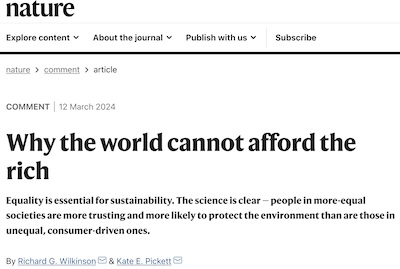
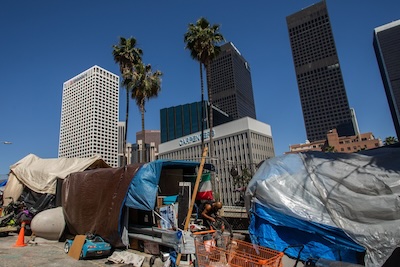 Our first source [1] is from Wilkinson & Pickett, authors
of the famous 2009 book Why More Equal Societies Almost Always Do Better (recommended!).
Our first source [1] is from Wilkinson & Pickett, authors
of the famous 2009 book Why More Equal Societies Almost Always Do Better (recommended!).
Their thesis: some degree of economic equality (or at least, less inequality than we have now) is essential for sustainability and for a civil society in which people accommodate each other, rather than striving for fascism to favor their “side”. The picture the editors chose to accompany their article, shown here, is bitterly ironic: a homeless encampment in front of posh office buildings in Los Angeles.
Why does anyone, with any sort of moral sensibility at all, tolerate this?
It’s not a recent phenomenon, since it goes back to the Reagan administration in the US, when so many things began to fray apart (or were forced to fray by conservative policy). But it has accelerated in the last few years:
Between 2020 and 2022, the world’s most affluent 1% of people captured nearly twice as much of the new global wealth created as did the other 99% of individuals put together, and in 2019 they emitted as much carbon dioxide as the poorest two-thirds of humanity. In the decade to 2022, the world’s billionaires more than doubled their wealth, to almost US$12 trillion.
Does that matter? After all, if a few people do spectacularly well, don’t the rest of us at least do reasonably well? That’s the usual argument offered from the right, though nowadays they avoid the phrase “trickle-down economics”. The truth is rather brutal:
The evidence gathered by social epidemiologists, including us, shows that large differences in income are a powerful social stressor that is increasingly rendering societies dysfunctional. For example, bigger gaps between rich and poor are accompanied by higher rates of homicide and imprisonment. They also correspond to more infant mortality, obesity, drug abuse and COVID-19 deaths, as well as higher rates of teenage pregnancy and lower levels of child well-being, social mobility and public trust. The homicide rate in the United States — the most unequal Western democracy — is more than 11 times that in Norway (see go.nature.com/49fuujr). Imprisonment rates are ten times as high, and infant mortality and obesity rates twice as high.
…
Violence and bullying are also linked to competition for social status. Aggression is frequently triggered by disrespect, humiliation and loss of face. Bullying among schoolchildren is around six times as common in more-unequal countries. In the United States, homicide rates were five times as high in states with higher levels of inequality as in those with a more even distribution of wealth.
So: is this a real, measurable effect in the world, or is it just complaining? Evidence points to the former: real, statistical measures show significance and strength to back their conclusion.
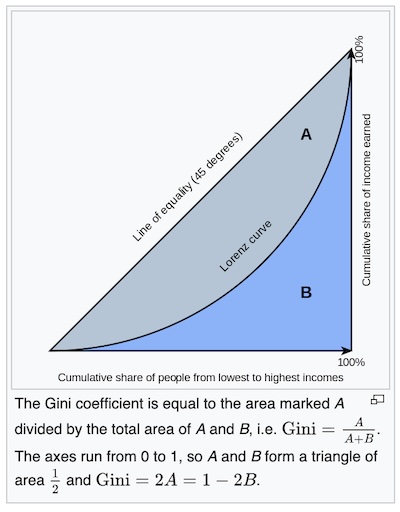 Economic inequality is usually measured by the
Gini coefficient. If you rank-order
people by their economic status (income, net worth, etc.), then you can assign to each
person a percentile rank in the population. The Lorenz curve plots this: how many people
are there, up to a certain percentile rank? See the curve shown here, from Wikipedia:
Economic inequality is usually measured by the
Gini coefficient. If you rank-order
people by their economic status (income, net worth, etc.), then you can assign to each
person a percentile rank in the population. The Lorenz curve plots this: how many people
are there, up to a certain percentile rank? See the curve shown here, from Wikipedia:
- A straight line from 0% to 100% is perfect equality: everybody makes/possesses exactly the same amount of money. (Not an economically desirable situation.)
- A flat line from 0% to 100% with a spike at 100% is perfect inequality: one person has all the wealth, and everybody else is just a slave. (Also not a desirable situation, for many reasons beyond the economic.)
The Gini coefficient starts with the Lorenz, and computes a score which ranges from 0 to 1 for the entire population. Considering the areas of the regions marked $A$ and $B$ in the diagram, the Gini coefficient is:
\[G = \frac{A}{A + B}\]$G = 0$ is the (undesirable) situation for absolute equality of income/wealth. $G = 1$ is the (even more undesirable) situation for all wealth held by a single person. In between is where we get to argue about whether society is fair and healthy.
So why all this mathematical muttering about inequality?
First: c’mon, this is my blog; it’s what we do here! You should know by now that your humble Weekend Editor’s default position is that anything which can be sensibly modeled mathematically, should be. That’s how we convince each other we’re telling ourselves the truth about the world, not just our preferences. Poking holes in such models is how we learn what matters.
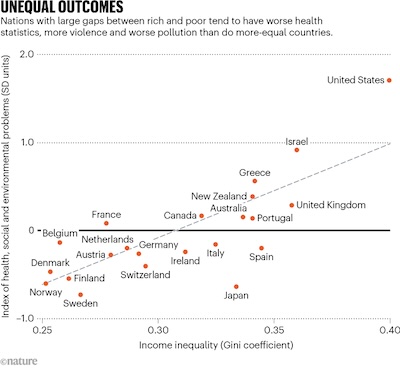 Second: it matters. Consider the plot shown here:
Second: it matters. Consider the plot shown here:
- The horizontal axis is our new friend the Gini coefficient. It shows countries of the world ranging from 0.25 (low inequality) to 0.45 (high inequality).
-
The vertical axis is a score assembled by Wilkinson & Pickett in their social epidemiology research. It combines an environmental score and a health & social problems score.
The environmental component includes measures of 5 factors:
five environmental areas: air pollution; recycling of waste materials; the carbon emissions of the rich; progress towards the United Nations Sustainable Development Goals; and international cooperation (UN treaties ratified and avoidance of unilateral coercive measures).
The health & social problems score includes measures of 10 factors:
infant mortality, life expectancy, mental illness, obesity, educational attainment, teenage births, homicides, imprisonment, social mobility and trust.
Now, I don’t know the details of their environmental and social health score. They also don’t report their data, so I can’t reproduce their regression. They don’t even report the slope coefficient and its 95% confidence limits, or even the $F$-test $p$-value of the regression. So about all we can do is admire the picture.
But the picture is damning:
- The US is in the upper right, with high inequality and a high degree of environmental and social problems.
- Look in the lower left, at all those well-developed European countries. Very good on economic inequality control, and also very good in terms of social health and environment.
- Also look at Japan: middling performance on economic inequality, but superb performance on environmental and social health. Japanese culture is a very peculiar beast: the ethos of “we’re all in this together” is very strong with them. So while there’s certainly room to be culturally exceptional, it’s clear Japan does this and the US clearly does not.
The medicines Wilkinson & Pickett prescribe for our illness are:
- More progressive taxation world-wide, to pay for transition to carbon-neutrality. In the US, for example, the top tax bracket is only 37%, after decades of tax giveaways to the wealth – for most of the 20th century it was 70%.
- International agreements must close tax havens and corporate loopholes. The über-wealthy conceal their wealth in places like the Cayman Islands (as exposed by the Panama Papers), and corporations do “inverse mergers” to get their headquarters in tax-favorable places unrelated to their actual businesses.
- It might be wise to experiment with a consumption tax: a levy paid on income minus savings. If you save & invest a lot, you don’t pay much; if you spend a lot, then you get taxed. This would reduce some of the status-signalling expenditure, particularly on the part of the wealthy, though really for all of us.
- Global legislation is needed on corporate governance, to ensure that especially the large corporations are run fairly and transparently. The ratio of top to bottom pay rates of more than 200:1 is just not sustainable, since it concentrates wealth in the hands of a few while impoverishing the rest.
Will we do that? Almost certainly not.
Will we pay the consequences of not doing that? Almost certainly so.
Why don’t we reduce inequality?
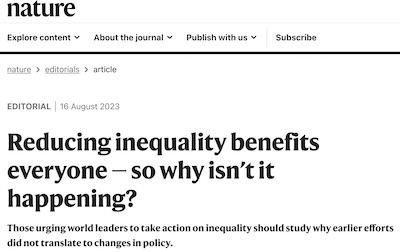 Our second source today is an unsigned editorial in Nature. [2]
(Again, consider the source here: one of the top-flight science journals.)
Our second source today is an unsigned editorial in Nature. [2]
(Again, consider the source here: one of the top-flight science journals.)
They note as a starting point that researchers from 67 nations wrote an open letter to the UN Secretary-General and World Bank president urging them to “redouble efforts to address rising extreme inequality”. This was one of the 17 goals on the UN Sustainable Development Goals, at which humanity is failing completely, as this goal has been “largely ignored.”
They point out that Wilkinson & Pickett’s The Spirit Level was widely admired among the political elites… and widely ignored when they set policy. That’s particularly frustrating, since research cited by this editorial points out that reducing inequality would help with almost all the other sustainability goals.
Researchers are right to urge leaders to prioritize inequality. They would do even better to study the efforts of Pickett, Wilkinson and others, and determine the reasons why these did not bear fruit.
So… perhaps we don’t address inequality because our leaders don’t know it would help with almost everything else? Or… perhaps they do know, but refuse to believe in reducing inequality, as it’s antithetical to the interests of the wealthy and the corporations, who fund their campaigns.
That’s a choice between ignorance and corruption, neither of which is a good look.
Maybe stop chasing growth, or at least growth at the cost of all else?
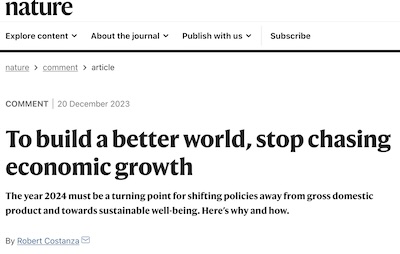
Our third source today is another commentary in Nature [3], attempting a root cause analysis of our problems. It places at least some blame on our relentless pursuit of economic growth, at the expense of literally everything else.
It cites a startling fact: the bottom 50% of humanity own as much wealth as 8 individual über-wealthy individuals, according to Oxfam in 2017.
David Brin suggests the problem is worse, since many assets have no clear owner. All traces disappear into a maze of shell corporations to conceal ownership and evade taxes. He proposes a “world ownership treaty”, that anything with no clear ownership can be escheated to a government; holders can avoid this penalty simply by openly declaring their ownership.
Crises are now normal in this global economic system that depletes natural and social capital, energy and time in the name of economic growth at all costs.

If you fetishize economic growth over all else, you are taking Moloch’s bargain, in the style of Scott Alexander’s masterful essay, “Meditations on Moloch”. [4]
Moloch is not one of The Good Guys: he was a Canaanite deity, whose bargain was: he gives you military victory, power, and wealth in exchange for sacrificing everything else you love, in this case by burning your children to death in a red-hot metal idol. The video here is from Fritz Lang’s masterful 1927 movie, Metropolis. It portrays an upper-class naïf discovering the hellish life of workers who are human sacrifices to production quotas, personified by Moloch as a direct economic comparison.
 For a counter to Scott’s Moloch essay, see his essay,
The Goddess of Everything Else [5]:
once in a great while, just very occasionally, emergent phenomena conspire to let us rise
above our social Darwinist origins to pursue social justice.
For a counter to Scott’s Moloch essay, see his essay,
The Goddess of Everything Else [5]:
once in a great while, just very occasionally, emergent phenomena conspire to let us rise
above our social Darwinist origins to pursue social justice.
It used to be that corporate leaders were capable of pursuing multiple goals: profit for the shareholders, of course, but also the needs of their workforce, their customers, their host communities, and so on. Milton Friedman, the famous conservative economist, put an end to that: we now pursue growth of shareholder value, and nothing else, in the fervent, but near-idolatrous, hope that markets provide.
The article documents the the Beyond Growth conference at the European Parliament, sponsored by the European Commission. At least people were talking about moving beyond GDP, to considering the health and welfare of people. To be sure, GDP is one component of welfare, but it’s not the only one.
Indeed, monomaniacal pursuit of economic growth may be the cause of our economic inequality problems, which in turn are at least a partial cause for all our other problems:
As the European conference emphasized, GDP was never designed to measure societal well-being — only market production and consumption. GDP says nothing about the distribution of income, unpaid work or damages to natural or social capital. The misuse of GDP as a policy goal is driving societies towards an unsustainable future that benefits an increasingly small proportion of the population while impoverishing the vast majority.
They propose that we should (a) develop better measures of social well-being, (b) model the complex dynamics of those measures in our economic system, and (c) set policy accordingly.
It sounds hard to argue against that, but I have a deep and bitter faith in people’s endless ability to obstruct anything that leads to a better life.
Maybe ‘rich enough’ includes a lot of people?
It may be, of course, that people fear reduction in economic inequality will reduce their own wealth. To that end, it’s worth considering how likely that is.
In the US, one can be reasonably prosperously retired, even in a high cost of living area, if one pays off all debt and saves a couple million dollars. That’s a lot of money, to be sure. But it’s not unattainable if one remains employed and saves at a reasonable rate in a tax-sheltered retirement plan (IRA, Roth IRA, 401(k), Roth 401(k)) over a career.
Indeed, right here on this Crummy Little Blog That Nobody Reads, we wrote a piece on Stanley & Danko’s Millionaire Next Door. [6] We pointed out that it’s very difficult indeed to join the top 1% in wealth, but it’s not terribly difficult to have a pretty good shot at the top 10%, or 20% worst case.
Being in the top 1/5th of the wealth distribution is a reasonably comfortable outcome for a career. These are not the über-wealthy! They’re just middle-class people who saved for the future. Taxation aimed at the multi-billionaires is not even going to be noticeable for them, except that everything else around them gets better.
The Weekend Conclusion
“Eat the rich” is a popular slogan among young folks in the West now. Better slogans might be: “tax the rich”, and “expose the rich” to public scrutiny of what they own.
(Ceterum censeo, Trump incarcerandam esse.)
Notes & References
1: RG Wilkinson, KE Pickett, “Why the world cannot afford the rich”, Nature 627, pp. 268-270, 2024-Mar-12. DOI: 10.1038/d41586-024-00723-3.
NB: Wilkinson & Pickett are authors of Why More Equal Societies Almost Always Do Better, from 2009. ↩
2: Nature Editorial Staff, “Reducing inequality benefits everyone — so why isn’t it happening?”, Nature 620, p. 468, 2023-Aug-16. DOI: 10.1038/d41586-023-02551-3. ↩
3: R Costanza, “To build a better world, stop chasing economic growth”, Nature 624, pp. 519-521, 2023-Dec-20. DOI: 10.1038/d41586-023-04029-8. ↩
4: SA Siskind, “Meditations on Moloch”, Slate Star Codex blog, 2014-Jul-30. Scott’s current blog is Astral Codex Ten. ↩
5: SA Siskind, “The Goddess of Everything Else”, Slate Star Codex blog, 2015-Aug-17. Scott’s current blog is Astral Codex Ten. ↩
6: Weekend Editor, “Bayes Rule vs The Millionaire Next Door”, Some Weekend Reading blog, 2021-Jun-01. ↩

Gestae Commentaria
Comments for this post are closed pending repair of the comment system, but the Email/Twitter/Mastodon icons at page-top always work.